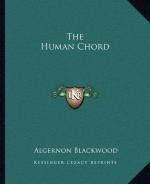Sometimes, too, he would send for the housekeeper and, with the aid of the violin, would lead the four voices, his own bass included, through the changes of various chords, for the vibratory utterance of certain names; and the beauty of these sounds, singing the “divine names,” would make the secretary swell to twice his normal value and importance (thus he puts it), as the forces awakened by the music poured and surged into the atmosphere about them. Whereupon the clergyman would explain with burning words that many a symphony of Beethoven’s, a sonata of Schumann’s, or a suite of Tschaikovsky’s were the Names, peaceful, romantic or melancholy, of great spiritual Potencies, heard partially by these masters in their moments of inspirational ecstasy. The powers of these Beings were just as characteristic, their existence just as real, as the simpler names of the Hebrew angels, and their psychic influence upon the soul that heard them uttered just as sure and individual.
“For the power of music, my dear Spinrobin, has never yet by science or philosophy been adequately explained, and never can be until the occult nature of sound, and its correlations with color, form, and number is once again understood. ’Rhythm is the first law of the physical creation,’ says one, ’and music is a breaking into sound of the fundamental rhythm of universal being.’ ‘Rhythm and harmony,’ declares Plato, ‘find their way into the secret places of the soul.’ ’It is the manifestation,’ whispers the deaf Beethoven, ’of the inner essential nature of all that is,’ or in the hint of Leibnitz, ’it is a calculation which the soul makes unconsciously in secret.’ It is ’love in search of a name,’ sang George Eliot, nearer in her intuition to the truth than all the philosophers, since love is the dynamic of pure spirit. But I,” he continued after a pause for breath, and smiling amid the glow of his great enthusiasm, “go beyond and behind them all into the very heart of the secret; for you shall learn that to know the sounds of the Great Names and to utter their music correctly shall merge yourself into the heart of their deific natures and make you ‘as the gods themselves...!’”
And Spinrobin, as he listened, noticed that a slight trembling ran across the fabric of his normal world, as though it were about to vanish and give place to another—a new world of divine things made utterly simple. For many things that Skale said in this easy natural way, he felt, were in the nature of clues and passwords, whose effect he carefully noted upon his secretary, being intended to urge him, with a certain violence even, into the desired region. Skale was testing him all the time.
III
And it was about this time, more than half way through the trial month, that the clergyman took Spinrobin, now become far more than merely secretary, into his fuller confidence. In a series of singular conversations, which the bewildered little fellow has reported to the best of his ability, he explained to him something of the science of true names. And to prove it he made two singular experiments: first he uttered the true name of Mrs. Mawle, secondly of Spinrobin himself, with results that shall presently be told.




